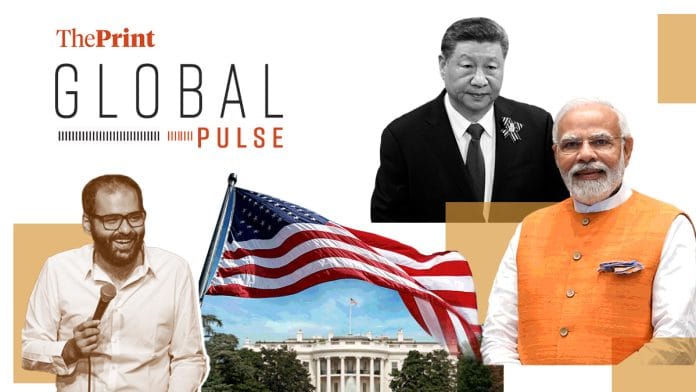New Delhi: China is edging its way into India’s neighbourhood, according to a report in Financial Times titled ‘China’s charm offensive in India’s backyard’.
In the past 14 months, since Muhammad Yunus came to power in Bangladesh following the student protests, Chinese officials have had “at least seven high-profile meetings with Bangladeshi politicians”, says the report. In Pakistan, the number is higher—Chinese officials have held “22 high-profile meetings this year with counterparts in Pakistan”.
“China sees what India considers to be its neighbourhood to be perfectly fair game for Chinese activities and influence,” Daniel Markey, senior fellow at the China and South Asia programmes at Stimson Center, tells FT. “That it is as much China’s backyard as it is India’s.”
For New Delhi, this is a longstanding fear that is coming to life.
“India is not in a strong position at present, so the Chinese may feel that it’s a good time to exploit that,” Amit Ranjan, a research fellow at National University of Singapore’s Institute of South Asian Studies, is quoted as saying.
“Ranjan adds that of the countries neighbouring India, New Delhi only has good ties with three smaller ones—Sri Lanka, the Maldives and Bhutan. But China has a presence in both Sri Lanka and the Maldives and it has been encroaching on Bhutan’s borders,” says the report.
“India’s isolation”—namely its deteriorating ties with the US—will also work to benefit China. “Among China’s many diplomatic manoeuvres in South Asia, its inroads into Bangladesh are among the deepest and most troubling for New Delhi,” adds the report.
“India believes that the Yunus government is too soft on Islamists and its closeness to China could leave the strategically important north-eastern Indian states vulnerable to border tensions. The states are connected to the rest of India by the narrow Siliguri Corridor, known as the ‘Chicken Neck’,” FT notes.
“During his visit to Beijing in March, Yunus stoked these fears by describing India’s north-east states as ‘landlocked’ and therefore reliant on Bangladesh for access to the ocean. Bangladesh could also become ‘an extension of the Chinese economy’,” according to the report.
In The New York Times, Mujib Mashal profiles comic Kunal Kamra—known for being in the government’s line of fire.
Kamra has stopped doing live shows almost entirely, after a mob “unleashed by local leaders of the ruling coalition” ransacked the club where he made a joke about a politician, Mashal writes.
“Kamra watched the free speech debate in the United States that followed (US late night talk show host) Jimmy Kimmel’s suspension (by the broadcaster) with a sense of déjà vu, alarm and lots of envy,” says the report.
“While their jokes were very different, the comics both ruffled the feathers of ruling politicians. But in India, the world’s largest democracy, creeping censorship over the past decade under Prime Minister Narendra Modi is so entrenched that the hosting of shows like Mr Kimmel’s, or any direct mockery of governing politicians, is increasingly out of the question,” it adds.
The report also draws parallels between US President Donald Trump and PM Modi.
“Many in India are astonished at how similar Mr. Trump’s playbook is to the one that has reshaped their country, from early attacks on universities to unleashing investigating agencies at opponents,” writes Mashal. “They see India as a warning to the world about how much can be lost when strongmen bend democracies to their will, and how quickly the shrunken space becomes normalized.”
The Washington Post finds yet another hurdle has emerged for Indians looking for the American dream. Those aspiring to study in the US, who have made it through every stage of the application process, are now failing the social media review, it reports.
It narrates the ordeal of an aspirant who had secured a scholarship to pursue a graduate degree at Columbia University. But two months after the new social media screening policy was announced by the Trump administration, he “received a letter from the US Embassy in New Delhi telling him his (visa) application had been rejected. The letter, which he shared with The Washington Post, did not cite his online activity. Instead, it stated he had not demonstrated sufficient ties to India that would ‘compel’ him to return home after his time in the United States”, says the report.
The aspirant had refrained from sharing personal views on social media, including Israel’s war in Gaza. “He had, however, spent four years working as a journalist and would post links to his stories, which often focused on hate crimes and were critical of India’s treatment of its Muslim minority,” adds the report.
Another 18-year-old student granted admission was once outspoken on Instagram and X. But he “couldn’t afford” to lose his shot at life in the US. So, he “completely stopped posting about international politics” and tried to wipe his accounts of content he thought could be held against him, recounting hours spent over three consecutive days “mass-unliking posts”.
Even students currently studying in the US “feel muzzled”, says The Post.
(Edited by Nida Fatima Siddiqui)
Also Read: 100 years of RSS and its role in Indian politics, and the ‘Russian oil’ splinter in India-US ties






